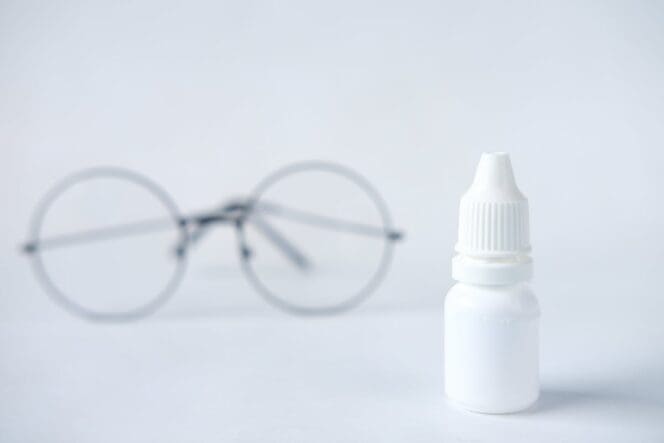Home / Presbyopia /
VUITY, Prescription Eye Drops for Presbyopia
Vuity is a new eye drop medication used to treat presbyopia, an age-related, blurry near-vision disorder. In October 2021, the U.S. Food and Drug Administration (FDA) approved Vuity for use in treating presbyopia in adults. Approval came after a series of successful clinical trials in which Vuity showed it could provide clear, up-close vision support for several hours with minimal side effects.

Vuity constitutes a unique version of pilocarpine, a medication classified as anticholinergic. It is distributed in a 5 ml bottle with 1.25-percent strength and only available with a prescription from an eye doctor.
Presbyopia affects approximately 128 million people in the United States and billions worldwide, requiring them to wear reading glasses or contact glasses when working on a computer or reading small text. Vuity, made by Allergen (an affiliate company of AbbVie), is the first FDA-approved medication that is publicly available to treat presbyopia.
What Are Vuity Eye Drops Used For?
Vuity is hailed as a significant innovation in age-related eye health. It is the first FDA-approved medication of its kind that is publicly available to treat presbyopia. The medication lets adults see up-close without needing the help of glasses or contact glasses and while still maintaining their long-range vision.
What Is Presbyopia?
Presbyopia is a progressive vision disorder that reduces the eye’s ability to focus on near objects, particularly in people over the age of 40. According to the American Academy of Ophthalmology, the term presbyopia comes from a Greek word meaning “old eye.”
Presbyopia is caused by the continued stiffening of the eye lenses as we age, where the lenses progressively become rigid and can’t change shape easily. The rigidity affects their eyes’ ability to focus light on the retina so you can see clearly close up.
Because there is no way to stop or reverse the normal aging process, doctors traditionally treated presbyopia has with eyeglasses, contact glasses and surgery.
How Do Vuity Eye Drops Work?
Vuity works by making your pupils temporarily smaller, which reduces the amount of peripheral light passing through them, thus making objects closer to you appear clearer and sharper.
According to the manufacturer, Vuity’s formulation allows it to adjust the physiologic PH of the tear film, which helps the eye’s own ability to reduce the pupil size. According to the National Eye Institute, the tear film helps to focus light so you can see clearly, among other things.
Vuity is administered through the eyes and usually works within 15 minutes, after which it significantly improves near vision for up to six hours or more, according to the clinical trial data presented at the annual convention of the American Society of Cataract and Refractive Surgery in 2021. Some reports suggest that it may take up to a month for the medication to work at its best.
Vuity eye drops are administered into each eye once daily with only one drop per eye. Remove your contact lenses prior to taking Vuity, and wait at least 10 minutes before re-inserting them.
If you are using other eye medications with Vuity, the manufacturer recommends that you space your medications out, at least five minutes apart. The American Academy of Ophthalmology (AAO) offers helpful tips on how to use Vuity and other eye drop medications.
Alternatives to Vuity
There are many eyedrop medications in the market that can treat many eye conditions. The other common alternative for treating presbyopia is through corrective eyewear.
Different types of glasses and contacts may be used to correct short-range vision problems depending on your specific needs. They include:
Vuity vs. Reading Glasses: Can Vuity Replace Your Reading Glasses?
Vuity comes as a relief to the millions of people who suffer from presbyopia. But while Vuity offers a more convenient solution for the malady, it is not intended to act as a total replacement for your reading glasses.
The makers of Vuity have a specific warning for users to observe caution when performing hazardous activities like operating machinery in dim lighting and when driving at night. Although you should talk to your doctor if you feel Vuity might be of help to you, keep your reading glasses handy in case you need them in addition to Vuity eye drops.
Frequently Asked Questions Regarding Vuity
What is Vuity used for?
Vuity is the first FDA-approved medication of its kind that is publicly available to treat presbyopia. The medication lets adults see up-close without needing the help of glasses or contact glasses and without losing their long-range vision.
Is Vuity a prescription drug?
Yes. Vuity contains a unique version of pilocarpine, a medication categorized as an anticholinergic and is available in strengths of 1.25 percent in a 5 ml bottle only with a prescription from an eye doctor. It is not available over the counter (OTC).
References
-
VUITY (pilocarpine hydrochloride ophthalmic solution) 1.25%, for topical ophthalmic use. (October 2021). Allergen.
-
U.S. Food and Drug Administration Approves VUITY™ (pilocarpine HCI ophthalmic solution) 1.25%, the First and Only Eye Drop to Treat Presbyopia (Age-Related Blurry Near Vision). (October 2021). AbbVie News Center.
-
Pilocarpine. (September 2016). American Society of Health-System Pharmacists, Inc.
-
Anticholinergic Medications. (May 2021). StatPearls Publishing.
-
What Is Presbyopia? (February 2022). American Academy of Ophthalmology.
-
How Tears Work. (July 2019). National Eye Institute.
-
How to Put in Eye Drops. (March 2021). American Academy of Ophthalmology.
-
Tips for Choosing the Right Reading Glasses. (October 2017). American Academy of Ophthalmology.
-
Guide to Bifocals and Multifocals. (June 2020). Optometrists Network.
-
Pros and Cons of Progressive Lenses. (June 2020). American Academy of Ophthalmology.
Last Updated March 23, 2022
Note: This page should not serve as a substitute for professional medical advice from a doctor or specialist. Please review our about page for more information.